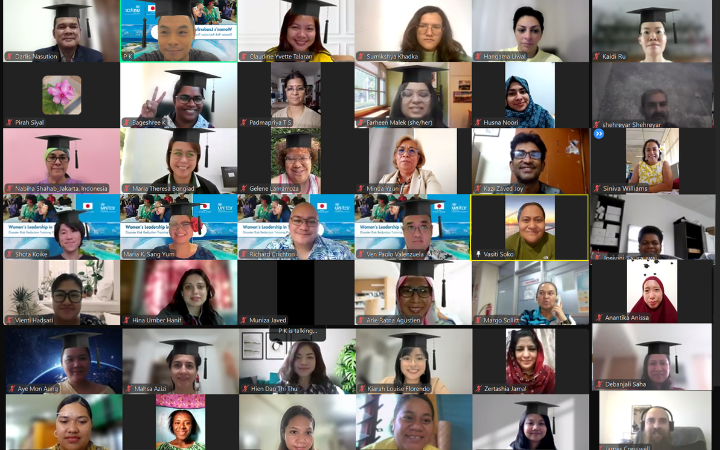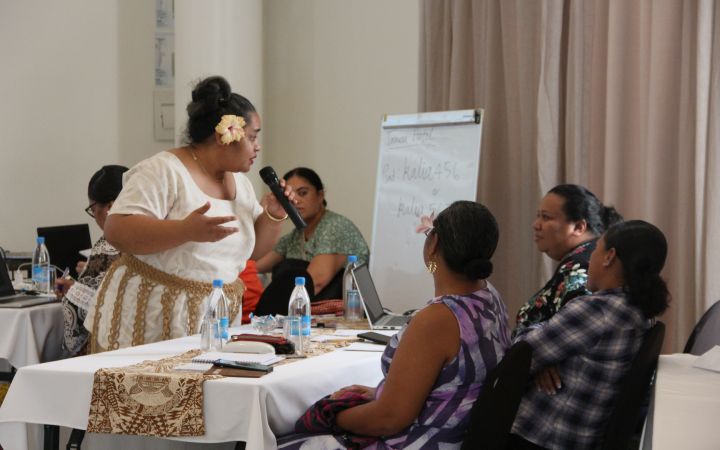- On 27 November 2024, UNITAR concluded the online phase of the “Women’s Leadership in Tsunami-based Disaster Risk Reduction” training programme, engaging over 130 participants from Asia and the Pacific Island region, in a series of “virtual classroom” webinars and online discussion forums.
- In Phase 1, participants learned about gender equality in disaster risk reduction, community-based disaster risk reduction, disability inclusion, and the empowerment of vulnerable groups within disaster risk reduction initiatives.
- The top performers will be invited to Phase 2, an in-person workshop in Fiji in March 2025.
6 December 2024, Hiroshima, Japan – On 27 November 2024, the online phase of the UNITAR “Women’s Leadership in Tsunami-based Disaster Risk Reduction” training programme was brought to a successful close. Over three months, participants from the Pacific Islands and Asia learned about climate and disaster resilience, risks management and challenges in the Asian and Pacific regions. Around 130 participants joined the closing webinar of the online training phase.
The course highlighted the importance of community-based measures for tsunami awareness and hazard risk reduction, as well as women’s leadership in disaster risk reduction – a space that is often male-dominated. In her closing remarks, the former director of the Fiji National Disaster Management Office Ms. Vasiti Soko congratulated and offered words of encouragement to the participants.
UNITAR will invite the top-performing participants from Phase 1 to the next phase, a regional in-person workshop in Fiji scheduled for March 2025. There, they will engage in expert-led lectures and coaching sessions and develop actionable and inclusive disaster risk reduction plans to promote women’s roles in disaster risk reduction, which they will implement in their respective countries.
This 2024 UNITAR disaster risk reduction training programme has been made possible thanks to the Government and People of Japan.
Phase 1: Learning Through Virtual Classrooms
Phase 1 of the training featured asynchronous online learning platforms and “virtual classrooms” webinars. The webinars covered coastal risk management issues in the Pacific region, the designing of community spaces for tsunami disaster risk reduction, and women’s leadership in disaster risk reduction.
Virtual classroom webinar on 4 September
- Women’s leadership in disaster risk management (Ms. Dixi Mengote-Quah, Disaster Risk Management Specialist, World Bank Tokyo Disaster Risk Management Hub)
Virtual classroom webinar on 18 September
- Disaster risk reduction and disaster waste management activities (Mr. Satoru Mimura, Advisor from the Global Environment Department, Japan International Cooperation Agency)
- Responsive disaster risk reduction through the lens of gender perspective (Ms. Branwen Millar, Gender Advisor, United Nations Office for Disaster Risk Reduction)
Virtual classroom webinar on 16 October
- Community space design for tsunami disaster risk reduction (Mr. Nobuhito Ohtsu, Senior Researcher from the National Research Institute of Fire and Disaster, Fire and Disaster Management Agency, and Ministry of Internal Affairs and Communications, Government of Japan)
- Coastal risk management tools available in the Pacific region (Ms. Judith Giblin, the Ocean & Coastal Risk Data Analyst in the Geoscience, Energy and Maritime Division at the Pacific Community)
Virtual classroom webinar on 6 November
- Women’s leadership in disaster risk reduction (Ms. Flora Vano, Country Programme Manager of Action Aid Vanuatu)
- Representation and roles of people with disabilities during crises (Mr. Jay Nasilasila, Programme Coordinator, Climate Change and Disaster Risk Reduction Unit, Fiji Disabled Peoples Federation)
Closing webinar on 27 November
In the final webinar of the online phase, Ms. Vasiti Soko, former director of the Fiji National Disaster Management Office, underscored the importance of inclusive national policies, the need for building partnerships, and the interplay of disaster risk reduction approaches and women’s empowerment.
We need to make sure that the policies were inclusive of women, and that there was a gender lens into our standard operating procedure. On behalf of the women, I’d like to see men champions in the Pacific who will also speak for women leaders when women are not present in the meeting.”
The webinars were followed by lively group discussions and critical thinking exercises, time allowing. Through these exchanges of ideas, participants got to know each other, building their regional networks for disaster risk reduction.
Next Steps: Top-Notch Performers to Continue Learning in Fiji
The participants whose performance stood out during Phase 1 will be invited to the next phase, an in-person workshop in Fiji in March 2025. The knowledge and experience from Fiji are highly relevant to the programme’s emphasis on the Pacific region, and will give participants valuable insights into the region’s challenges and existing capacities. The workshop will feature expert-led lectures on topics ranging from policy and governance in disaster risk reduction, disaster risk communication, hazards and disaster risks in the Pacific, to the roles of gender and people with disabilities in the context of disaster risk reduction. Participants will develop their action plans and work in groups to develop a presentation on an effective disaster risk reduction plan for their communities.
About The “Women’s Leadership in Tsunami-Based Disaster Risk Reduction” Programme
The UNITAR “Women’s Leadership in Tsunami-Based Disaster Risk Reduction” programme aims to equip individuals who are passionate about women’s leadership in disaster risk reduction with lifelong skills to develop inclusive disaster risk reduction plans contextualized to the needs of their communities and countries. Delivered in two phases, the programme runs from September 2024 to March 2025.
- Phase 1 (September to November 2024) is asynchronous online learning with expert-led webinars, group exercises and presentations.
- Phase 2 (March 2025): The top-performing participants will be invited to Fiji to develop action plans for effective disaster risk reduction in their communities.
The programme is offered free of charge thanks to the generous support of the Government and People of Japan. This programme is part of UNITAR’s new initiative, “Shimanami Collective”, which is a series of training programmes to build resilience against disasters and to enhance sea and human security.
About UNITAR
The United Nations Institute for Training and Research (UNITAR) is a dedicated training arm of the United Nations. In 2023, UNITAR trained over 540,000 learners around the world to support their actions for a better future. UNITAR has a global presence, with offices in Geneva, Hiroshima, New York and Bonn and networks around the world. Find out more at www.unitar.org



